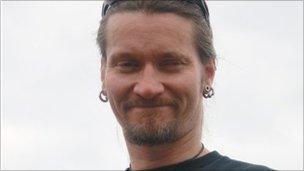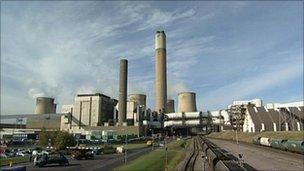Undercover Pc Mark Kennedy 'really sorry for betrayal'
- Published

Pc Mark Kennedy spent years working undercover in the green movement
An undercover officer who infiltrated a group of green activists apologised to them for his "betrayal" months before they were due to go on trial.
In a taped conversation obtained by BBC Newsnight, Pc Mark Kennedy told an activist he was "sorry" and "wanted to make amends".
The trial of six activists, accused of conspiring to shut down a power station, collapsed on Monday.
Mr Kennedy had offered to give evidence on the campaigners' behalf.
Nottinghamshire Police has asked the Independent Police Complaints Commission to investigate the circumstances leading to the collapse of the case.
The six environmental activists were accused of conspiring to shut down the Ratcliffe-on-Soar power station in Nottingham.
In the taped phone conversation, which was made in November, Mr Kennedy admitted he had been in the police, but said he was not now.
He said: "I hate myself so much I betrayed so many people.
"I owe it to a lot of good people to do something right for a change... I'm really sorry.
"If I can help in any way then I'd like to."
Confronted
He also suggested there were other undercover policemen involved in the protest movement.
"I'm not the only one - not by a long shot," he said.
Mr Kennedy had been intimately involved in the green movement since 2000.
He told the campaigners' defence team he would be prepared to help them, and the prosecution then offered no evidence before the trial was due to get under way.
Speaking outside Nottingham Crown Court after the collapse of his clients' trial, solicitor Mike Schwarz said police need to answer "serious questions" about Mr Kennedy's actions and efforts to charge the activists were a "serious attack on peaceful, accountable protest".
He said: "My clients were not guilty. They did not agree to join in any plan to occupy the power station. The evidence of Pc Kennedy presumably confirmed this.
"Yet that evidence, had it been kept secret, could have led to a miscarriage of justice."
A CPS spokeswoman said that "previously unavailable information that significantly undermined the prosecution's case" had come to light on 5 January.
She said: "In light of this information, the Crown Prosecution Service reviewed the case and decided there was no longer sufficient evidence for a realistic prospect of conviction."
Lord McDonald, who was Director of Public Prosecutions during the time Pc Kennedy was undercover, has questioned the decision to deploy him.
He told the BBC: "This is not serious, outrageous, dangerous crime that threatens the state.
"We're talking about a long-term police operation. A single officer embedded for seven years.
"This is not a terrorist organisation. I do think there is a serious question of proportionality."
The Met Police are refusing to comment officially on Mr Kennedy and would not say whether or not he is still a police officer.
Twenty protesters were sentenced to a mixture of community orders and conditional discharges last week, after being convicted of conspiracy to commit aggravated trespass at Ratcliffe.
Mr Schwarz said the case raised "key questions" over the cost of deploying the undercover officer and whether it was reasonable to incur costs of "hundreds of thousands of pounds".
He added: "One expects there to be undercover police on serious operations to investigate serious crime. This was quite the opposite.
"This is civil disobedience which has a long history in this country and should be protected."
Defence lawyer Mike Schwarz: "These events beg wider, serious questions"
Danny Chivers, who was one of the six defendants in the failed case, said Mr Kennedy was not just an observer, but an agent provocateur.
"We're not talking about someone sitting at the back of the meeting taking notes - he was in the thick of it."
Truck hire
Mr Kennedy lived a double life as Mark Kennedy of the Metropolitan Police and as Mark Stone, green activist, based in Nottingham.
He was known within the green campaign as Mark "Flash" Stone, having earned the nickname because he always seemed to have more money than the other activists.
But in October 2010, Mr Kennedy was confronted by some of the activists after they found documents which revealed his true identity.
He admitted he had been a Met Police officer and had infiltrated their organisations, before then disappearing.
Speaking about the Ratcliffe-on-Soar protest, Mr Chivers said: "Mark Stone was involved in organising this for months - they could have stopped it at the start."
Instead, Mr Chivers said the police officer helped recruit as many people as possible.
He also drove a reconnaissance party to the power station in his van and then hired a truck for the main protest, Mr Chivers added.
The activists' plan was to try to shut down the coal-fired power station for a few days as a protest against global warming.

Twenty people were convicted over the Ratcliffe-on-Soar case last year
But in April 2009, when 114 people had gathered for a meeting at the Iona School in Nottingham, hundreds of police swooped on the building and arrested them all for "conspiracy to commit aggravated trespass".
Ratcliffe-on-Soar was one of many actions in Britain and across Europe which Mr Kennedy was involved in, including the protests against the G8 summit at Gleneagles in 2005 which helped give birth to the Climate Camp movement.
When confronted, Mr Kennedy told the activists he left the police after the Nottingham arrests in 2009.
It is unclear whether this is true, or where he is now.
David Winnick, a Labour member of the House of Commons Home Affairs Select Committee, has called for Home Secretary Theresa May to make a statement to MPs on the case, saying his concern was "the manner in which it has been alleged that Kennedy acted almost as an agent provocateur".
Former Met deputy commissioner Bob Quick told the BBC's Today programme that the use of undercover officers was "an established tactic" for the police.
"There are some risks attached, and occasionally things do go wrong," he said.
"Undercover officers are uniquely vulnerable individuals. Whilst they are, in my experience over 30 years, very dedicated, brave and very professional, they are vulnerable because they are being constantly exposed to potentially corrupting and criminal influences and all sorts of relationships they get into to try and become effective in securing intelligence about criminality."
But he said it was "extremely rare" for undercover officers to change their position and begin to sympathise with the groups they had infiltrated.
- Published10 January 2011
- Published5 January 2011
- Published6 January 2011
- Published10 January 2011